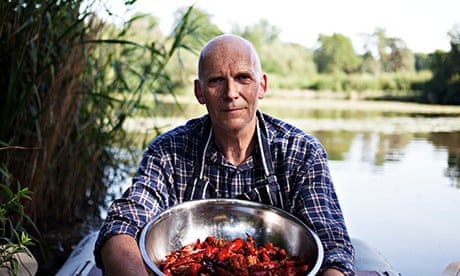In the early 2000s, I sailed the full length of the non-tidal Thames, from Teddington to Lechlade and back again. Seeing dead crayfish on the way made me wonder what had been done about the American crayfish invasion since I first read about it in the 1980s, which I realised was very little. So I decided I would do something.
In the 1970s, the British government introduced the American Signal crayfish to UK waters for export to the lucrative Scandinavian market. Within a few years they realised this species was a carrier of the crayfish plague, to which it is immune, but which kills off other species. Much of our native white-clawed crayfish population was wiped out and, without a viable solution, the crayfish farms were abandoned. I set about trying to figure out a large-scale affordable system for ridding the waterways of this species, which, really, is what the government should be doing – you can't have one bloke doing all the trapping…
Environmentalists thought for a long time that trapping wouldn't work, because trappers only took the big fish and left the small ones in the wild. So I focused on what you could do with the small ones. I founded the National Institute of Crayfish Trappers in 2010 (nict.org.uk), came up with the name Crayfish Bob, designed a logo and website, and began doing pop-up events. Bea's of Bloomsbury got in touch about a crawfish boil, which ran for 22 weeks – we got through a lot of crayfish! It all took off from there.
Off the back of that, we got into Glastonbury in 2011. This year was our third Glasto, and we won the Sustainable Green Trader award. We're going to Camp Bestival next week. Borough Market invited me to do a month-long pop-up stall in the run-up to Christmas last year, and Grub Club got involved recently too.
In the past four years, I can honestly say from the sales figures that I've introduced a whole market – there's an interest that wasn't there before. We're supplying excellent wild crayfish, with a sweet, delicate flavour, in contrast to the heavily processed, flavour-enhanced crayfish on the market which is imported Chinese tail meat. For us, it's not just about the tail. As any Swede would tell you, there's a massive amount of flavour in the rest of the body too. And the dishes we make involve the whole fish – gumbo, escabeche, potted crayfish, Swedish-style crayfish in shell...
A growing interest in American cuisine has helped. I learned how to make gumbo from people I met from Louisiana. They used a lot of powdered stock, but I now make from scratch, with trout, eel skin from the smokehouse, wild duck if I have any or else chicken bones, and an absolute pile of crayfish. At our events wWe also have live Cajun/Zydeco music and crayfish racing at our events – it's about the whole experience being as authentic as possible. If I could have people eating seated on chiller chests I would.
Getting rid of all the American Signal crayfish in our waterways is probably unlikely, but we can certainly make a difference – taking out a few tonnes from a lake means the native species will be less disturbed. Ultimately, I need to get rid of of crayfish and crayfish products – my dreams are so much bigger than what we are doing right now. But it's a massive challenge – it's a real cowboy industry: it's like the wild west.






Comments (…)
Sign in or create your Guardian account to join the discussion